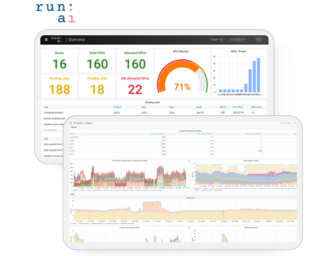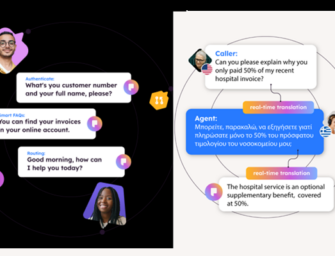Okay Djingo, Let’s Beat Amazon Alexa to France Says Orange. Will it Work?
Companies are starting to wake up and recognize how important the voice era will be for customer relationships. Orange is the former France Telecom and the country’s largest mobile provider with over 35% market share. Neither Amazon Echo nor Google Home are officially available in the country presumably because the voice models for the French language are not complete for Amazon Alexa and Google Assistant. Orange hopes to beat Amazon Alexa to market by launching a French-speaking virtual assistant called Djingo in early 2018. The company announcement claims:
Djingo is the intelligent assistant from Orange that can be controlled by voice or text. It offers an easy and intuitive way for you to navigate Orange TV, manage your connected home, make a call or access lots of other services.
Here is a video demonstration of the product concept in French with English subtitles. I say concept because it is pretty clear that the demo is simulated. Given the 2018 launch date, it is not surprising that a live demonstration is not yet available. This is what is called “freezing the market.” You tell people something is coming soon in hopes of delaying their purchase of a competing product that may become available earlier.
Mobile App, Tabletop Smart Speaker and TV Remote
 Orange doesn’t appear to be satisfied to come to market with a minimum viable product. It is planning from the beginning to have a mobile app, a tabletop smart speaker similar to Amazon Echo Dot and a voice-activated TV remote similar to Amazon’s Fire TV Remote. Amazon recently made Alexa available through it’s smartphone app, but these three products were rolled out over two-and-a-half years. Orange expects to have all out next year.
Orange doesn’t appear to be satisfied to come to market with a minimum viable product. It is planning from the beginning to have a mobile app, a tabletop smart speaker similar to Amazon Echo Dot and a voice-activated TV remote similar to Amazon’s Fire TV Remote. Amazon recently made Alexa available through it’s smartphone app, but these three products were rolled out over two-and-a-half years. Orange expects to have all out next year.
But wait, there’s more. Ovum reports that Orange also plans to replicate Amazon’s less famous Dash buttons. These were designed to facilitate reordering of food and supplies from Amazon.com. Ovum’s Francesco Radicati observed:
Livebutton is similar to Amazon’s Dash button. However, instead of focusing on purchases, the device is designed to let users perform specific tasks or functions with the press of a button. Use cases mentioned include turning off all the lights before leaving home or sending parents an SMS to tell them their kids have returned home.
Most people already have “buttons” to turn off the lights and a text or message through Djingo would seem more than sufficient to let parents know the children were home. Why a button at all? Why not facial recognition at the entry door? Maybe the Livebuttons are part of some grand strategy, but Amazon seems to be treating it more as a marketing gimmick and data collection tool than a real customer utility. The Wall Street Journal reported in 2016 that fewer than half of consumers that bought Dash buttons used them even once. If these are just a replacement for smart home automation, then Orange is really just recreating an existing market.
Will There Be Any Djingo Voice Apps?
Orange makes a strong case that it is an open platform, “entirely based on APIs and microservices,” that will enable it to easily integrate with any chatbot. That will be important, but it is unclear whether developers would build strictly for the Orange platform. Christophe Roux, Responsable Technique for Orange, outlined the company’s strategy in another video again with English subtitles.
In reviewing the two videos announcing Djingo, the most obvious difference is the logical, intellectual approach the Orange spokespeople take in promoting the product and its expected features. Amazon and Google both stress single, tactical features or fun elements to elicit emotional responses from consumers. That approach seems to be working given the sharp increase in Amazon Echo sales in late 2016 and strong start for Google Home. Orange still may deliver an emotional or fun approach to promotion when the Djingo is closer to launch.
However, the bigger problem may be the availability of consumer apps. Even with an open API, will developers port their voice applications for use by Djingo. IBM faced this problem with PS/2, Apple Mac’s later faced a similar situation and more recently, Blackberry and Windows suffered from lack of applications for mobile device consumers. Third-party applications offer value for consumers. Amazon has over 10,000 skills for Echo users and Google Home is slowly adding to its Action catalog. It’s not just about the platform. It is also about the apps. Making integration easy is not enough. You have to bring a big market with active users as well.
There are voice-first developers in France today. Smartly.ai and the creators of the Alexa skill Jab come to mind. Techstars also recently announced a new Paris accelerator with “Artificial Intelligence, Data and Bots” being among several focus areas. Orange is not listed as a sponsor, but the TechStars move along with some existing French companies in the AI space suggest that a local AI and voice ecosystem can be built. The open question is whether Orange will be able to take advantage of it or if developers will continue working on the Amazon and Google platforms.
IBM Watson and Microsoft Participating
Ovum also noted that IBM Watson is being used behind a new banking app that Orange is promoting. That is a smart move to enlist a leading AI platform to help accelerate the process. However, IBM’s experience in the space thus far is mainly for B2B applications. Consumer experiences are different and require a broad developer ecosystem. Microsoft may be able to help on this front and apparently is participating, but it is not clear in what capacity. The Djingo platform presents the risk of being light on supply-side features and on demand side interest.
The more interesting revelation is that Deutsche Telekom is partnering on the project with Orange. Deutsche Telekom already has competition in Germany from Amazon Echo and the Fire TV remote and Google Home is expected later this year. Its other markets will all require additional language models to be built so it is unclear whether being late to market with a likely inferior product will do the telco much good. There is clear value in controlling your voice era future. Orange and Deutsche Telekom are taking a difficult path to success, but it is still early and everyone that executes well has a chance to succeed.
Alexa Skills Pass 10 Thousand in US, 4 Thousand in UK, Germany Trails









